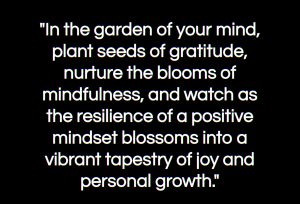Life’s uncertainties and the ongoing flux of world events have an impact on the difficult process of overcoming negative thoughts. It is essential to recognise and comprehend one’s fears and worries, as they can naturally elicit feelings of fear and concern. However, it is crucial not to dwell too long on potential outcomes, as this can lead to a detrimental cycle of negative thoughts and behaviours.
Progress towards diminishing fear and worry requires a nuanced understanding that progress may unfold gradually. Setbacks are not only common but also expected in the journey to overcome negative thoughts. Fostering resilience, exercising patience, and maintaining persistence are essential. Over time, this steadfast approach should yield tangible improvements in one’s capacity to effectively manage and minimise the impact of negative thoughts.
The cyclical nature of thought and emotion is particularly prevalent when faced with life’s uncertainties and the myriad happenings in the world. It is imperative to avoid succumbing to a continuous loop of negative thoughts and corresponding behaviours by dwelling excessively on potential outcomes.
Embracing the journey to overcome negative thoughts involves recognising that setbacks are not deviations but integral parts of the path. Building resilience, cultivating patience, and sustaining persistence are the guiding principles. Through this dedicated approach, gradual but significant enhancements in the ability to manage and minimise negative thoughts are likely to transpire over time.
Mindfulness Techniques for Anxiety
Mindfulness techniques are powerful tools to alleviate anxiety and promote mental well-being. Here are some simple practices to incorporate into your daily routine:
Breath Awareness
- Find a quiet space.
- Inhale deeply, focusing on your breath.
- Exhale slowly, letting go of tension.
- Repeat, grounding yourself in the present moment.
Body Scan:
- Sit or lie down comfortably.
- Direct your attention to different parts of your body.
- Notice any tension and consciously release it.
- Progress from head to toe, promoting relaxation.
Mindful Walking
- Take a leisurely walk.
- Feel each step and the connection with the ground.
- Observe your surroundings without judgement.
- Engage your senses in the present experience.
Cultivating social support networks
Building a supportive social network is essential for managing anxiety. Consider these approaches:
Open Communication:
- Share your feelings with trusted friends or family.
- Expressing concerns fosters understanding and empathy.
- Open conversations can lead to valuable insights.
Join supportive groups
- Seek out clubs, classes, or online communities related to your interests.
- Shared activities create natural bonds.
- Supportive environments provide a sense of belonging.
Volunteer or help others
- Engaging in altruistic activities builds connections.
- Volunteering fosters a sense of purpose and accomplishment.
- Helping others often leads to reciprocal support.
Understanding Anxiety Disorders
Identifying anxiety disorders is crucial for effective management. Explore these insights:
Generalised Anxiety Disorder (GAD)
- Excessive worry about various aspects of life.
- Physical symptoms like restlessness and muscle tension.
Panic Disorder
- Sudden and intense panic attacks.
- Fear of future attacks leads to avoidance behaviours.
Social Anxiety Disorder
- Intense fear of social situations.
- Avoidance of social interactions due to anxiety.
Specific Phobias
- Extreme fear of specific objects or situations.
- Altered behaviour to avoid triggering phobias.
Practical Steps to Address Anxiety
Seek professional guidance.
- Consult a mental health professional for personalised advice.
- Therapists can provide coping strategies and therapeutic interventions.
Develop coping mechanisms
- Learn and practice coping techniques.
- Establish a routine that includes self-care and stress management.
Medication if necessary
- In some cases, medication may be prescribed.
- Consult with a healthcare provider to explore this option.
Remember, addressing anxiety is a gradual process. Combining mindfulness practices, social support, and awareness of anxiety disorders forms a holistic approach to promoting mental well-being.






